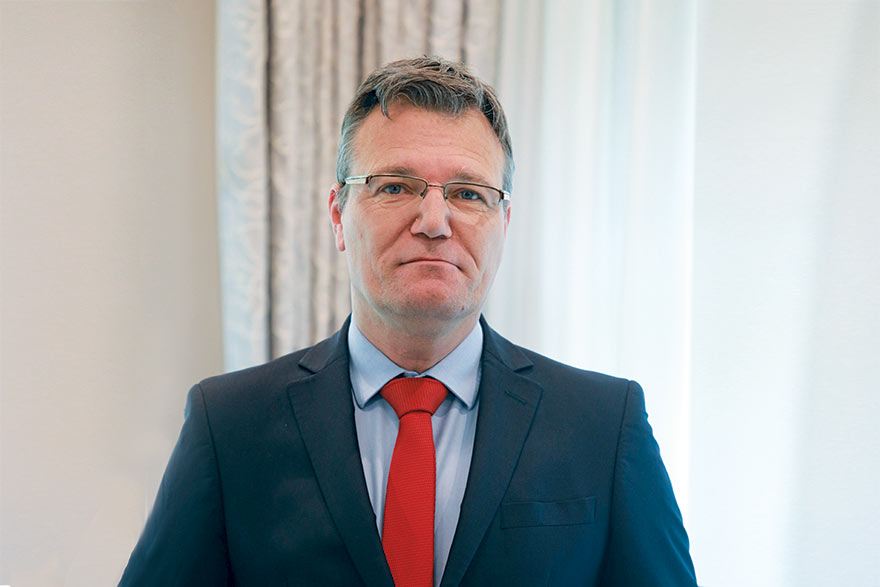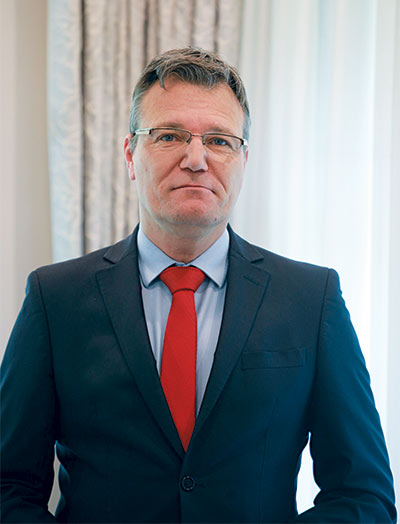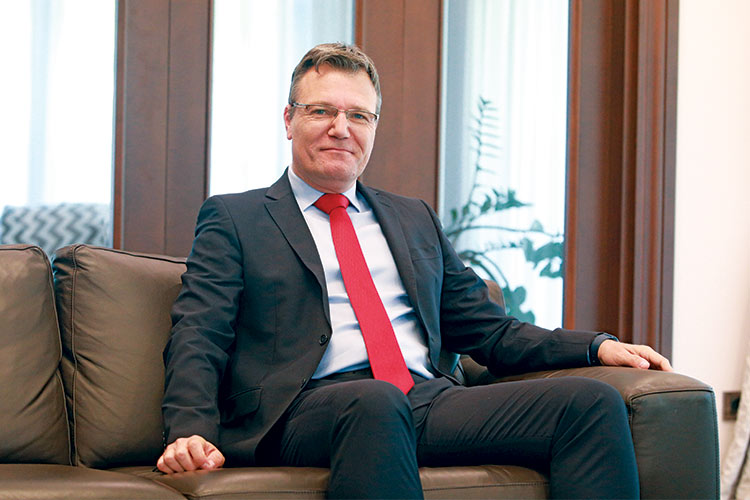It is true that there is still a lot of work ahead of us, especially for candidate countries. It is also true that there are different opinions and positions among EU Member States. However, that doesn’t mean that there will be no enlargement – Damjan Bergant
There has been no kind of non-paper on changing borders in the region that has come from Slovenia, insists Slovenian Ambassador Damjan Bergant, speaking in this interview for CorD Magazine. Responding to current questions posed on the eve of the start of the Slovenian Presidency of the Council of the EU on 1st July, the ambassador adds that Slovenia supports “the territorial integrity and sovereignty of all countries in the Western Balkans, including Bosnia-Herzegovina”.
Your Excellency, Slovenia takes over the presidency of the Council of the EU from 1st July. What are the key topics that you will include in the agenda until the end of the year?
– As it seems now, a month from the start of the Slovenian Presidency, we will work on the following four general topics: a resilient EU that enjoys the trust of its citizens; economic renewal of the EU based on digital and green transitions; an EU based on the rule of law, the European way of life and; a Secure EU, as a good and reliable partner in the neighbourhood and around the world.
Priorities are still a work in progress. I’m sure the general topics will be more or less aligned with what’s been presented. Moreover, if I delve into the details a little, and this is what is of interest to Serbia, I can say that the Western Balkans will be high among our priorities, within the topic of a Secure EU, as a good and reliable partner in the neighbourhood and around the world.
However, allow me to note that the functioning of the Presidency of the Council of the EU has changed a lot since 2008, when Slovenia had its first presidency. The role of the country tasked with leading the Council of the EU is more that of a coordinator than a leading decision maker. I would like to specify that decisions depend on all 27 member states and proposals made by the European Commission.
You’ve announced that Slovenia will continue advocating for the continuation of the EU enlargement process during its presidency. Which arguments in favour of EU enlargement can be deployed today, when it seems that there is no real mood of enthusiasm to welcome new members?
– I believe that the EU is the only alternative for Western Balkan countries in the future, given that the countries concerned are geographically in Europe and are surrounded by EU member states.
Saying simply that there is no real mood of enthusiasm for new members in the EU gives the wrong impression and sends an erroneous signal to the public, especially to the citizens of the countries concerned. Nevertheless, it is true that there is still a lot of work ahead of us, especially for the candidate countries. It is also true that there are different opinions and positions among EU member states. However, that doesn’t mean that there will be no enlargement. It is important to have a goal in front of everything. If the will to achieve this goal is strong and the work is done, the goal will be achieved. This is the only spirit for candidate countries and their citizens to follow when negotiating membership.

I’m sure that, when Serbia carries out all its necessary duties and fulfils the obligations for membership, there will be no obstacles to it becoming a new member of the EU. The present Government is on the right track to do the work and take steps slowly forward. It is also very important to bear in mind that everything being implemented as an EU candidate country is positive for the country itself and for its citizens. Last but not least, the efforts exerted in the implementation of obligations for EU membership are implemented not because of EU members and the Commission, but because of the country concerned.
Serbia hasn’t opened a single new accession negotiation chapter for more than a year. Do you think something can change in that respect during the Slovenian Presidency?
– The negotiation process is in the hands of Serbia and the European Commission. In the end, member states decide according to the proposals of the Commission and their political opinions.
Slovenia doesn’t see any obstacles to Serbia opening any new chapters. We hope that all will agree. Nevertheless, as said, Slovenia is equal among all and the decision does not depend on us solely.
We will work on the following four general topics: a resilient EU that enjoys the trust of its citizens; economic renewal of the EU based on digital and green transitions; an EU based on the rule of law, the European way of life and; a Secure EU, as a good and reliable partner in the neighbourhood and around the world
The opening of chapters is important, but closing them is even more important. It will be a great success when everything is ready to pass a decision not only for opening chapters, but also for closing them.
Slovenian MEP Tanja Fajon is a member of the delegation tasked with monitoring the interparty dialogue on election conditions in Serbia. How do you see this process and are you at all concerned about the very harsh comments of individuals from the government directed against Mrs Fajon?
– The interparty dialogue is an important process and we hope for a successful outcome. It is important that the ruling parties and the opposition find a common language in working for the progress of Serbia in the political field. And it is not important whether this is achieved with or without international mediation. The most important thing is to have results and to achieve the OSCE/ODIHR recommendations from the last report on parliamentary elections.
As for comments made by politicians about individuals, including members of the European Parliament, I wish for more political culture to prevail in politics everywhere. This is what people everywhere deserve.
Your Excellency, can you solve the mystery of the socalled non-papers about the future of the region, primarily B-H and Serbia, or at least the example which had its authorship attributed to Slovenia?

– There has been a lot of discussion and articles about different nonpapers in the last couple of weeks. I believe that Slovenia has been clear enough in stating that no document has come from Ljubljana or Slovenia. Slovenia’s foreign policy has not change and we support the territorial integrity and sovereignty of all countries in the Western Balkans, including Bosnia-Herzegovina.
One could ask what reasons stand behind the launch of such an idea among people who oppose war and have not forgotten the tragedies of the ’90s. Have there not been enough human victims and tragedies? Politicians, leaders, diplomats and others should find answers to these problems through dialogue. There is no doubt that different opinions and solutions exist. However, there is no need to enforce unilateral solutions, especially not ones that change existing borders. As President Pahor said during his visit to Belgrade, the possible changing of borders might start peacefully, but it can end with war.
You’ve said that no unresolved issues exist between Slovenia and Serbia and that bilateral cooperation is good. How will the Slovenian government respond to the request of Serbs living in your country that they be able to answer questions related to national and religious affiliation during the upcoming census?
– This isn’t only my opinion, but rather the opinion of top representatives of both Serbia and Slovenia. As President Vučić stated during the visit of President Pahor, there are no open issues between our two countries and cooperation is good. The upcoming census has nothing to do with bilateral issues between Serbia and Slovenia.
As for comments made by politicians about individuals, including members of the European Parliament, I wish for more political culture to prevail in politics everywhere. This is what people everywhere deserve
The previous year has been marked by the global struggle against the COVID-19 pandemic. And a question that’s current relates to the conditions under which travellers will be permitted to enter EU countries. Greece accepts certificates confirming the vaccination of Serbian citizens with any vaccine. What will Slovenia’s stance be like?
– I hope that there will be a common EU decision regarding the reciprocity of the acceptance of digital certificates with vaccination data, PCR tests or the overcoming of the COVID 19 virus by individuals. If not, then every EU member state should negotiate alone with countries outside the EU regarding the acceptance of certificates. I’m sure that Slovenia and Serbia will reach a solution enabling citizens of both countries with certificates to enter both countries.

To what extent has the COVID crisis impacted on economic relations between the two countries and do you see signs of bilateral cooperation recovering?
– It is clear that COVID has had a negative impact on the economies of our two countries. If you cannot have direct contact between managers and companies, it is very difficult to advance. Nevertheless, on the other side, the economy is a very adaptable issue. Economic relations between Slovenia and Serbia mostly existed even during the very strong waves of the pandemic and I’m hopeful that the situation will improve in the future.
With your arrival to take on the post of Slovenian ambassador to Serbia, you returned to the city where you served in the army. How do you see Belgrade today?
– Belgrade is a city that’s modern and very nice city. It is a major capital, with all the positive and negative consequences of that. The local government of the City of Belgrade is doing its best to make the city better, more attractive and even nicer. With its excellent restaurants, bars and interesting places, Belgrade has great potential.
I would be very happy if the priorities of the city’s leaders were orientated more towards everyday traffic and public transport. Another problem is air pollution, which is a big issue for both the city and the state. Finally, yet importantly, I feel excellent in this city.
| NON-PAPERS Among the main topics of our discussion will be the excellent long-term bilateral relations with an emphasis on economic ties and support for mutual investments | EU The Czech Republic has always supported further enlargement of the Union, because we believe that membership consequently leads to peace, stability and prosperity | OBLIGATIONS I don’t understand why intelligence officers should be crowded at the Russian Embassy, when we certainly need more experts on economic, cultural and other cooperation |
|---|